Kingdom of the Planet of the Apes
“Humans can never be trusted.”
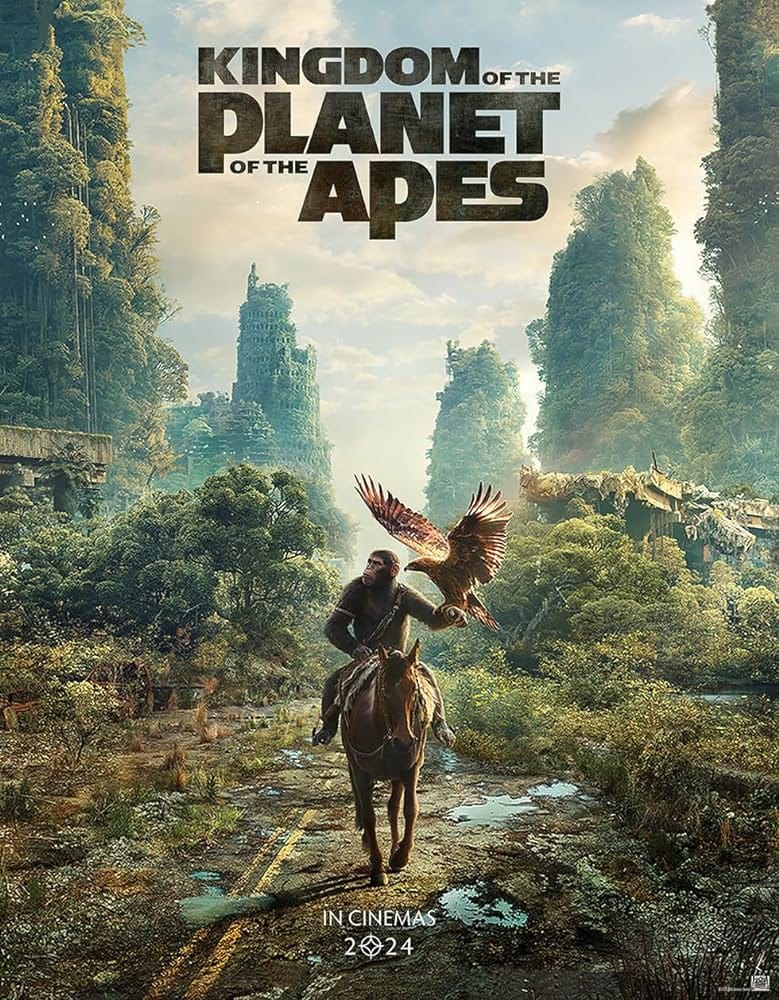
Many years after the reign of Caesar—the first ape to say no to a human—a young ape prince must embark on perilous journey into the unknown, so that he can save his people from both the iron fist of an ape tyrant and his army of zealots, and also from the dangerous legacy of the planet's former masters…
The Planet of the Apes movies have always been some of the best examples of science fiction examining big issues in society. Beginning in 1968, the various films of this franchise have addressed such relevant topics as racism, imperialism, police brutality, xenophobia, authoritarianism, as well as the dangers of a society built on hubris and greed, not to mention an almost Cassandrian depiction of a world caught in the clutches of a virulent and deadly virus.
2011’s Rise of the Planet of the Apes was the first film in the Planet of the Apes reboot trilogy, which told the story of Caesar, a chimpanzee who was gifted with increased intelligence as a result of a laboratory experiment. Despite being raised by caring humans, Caesar is abused by the greater world, and soon finds himself at the head of an ape revolution, leading his fellow intelligent apes to freedom, away from the violent and destructive reach of the world of man as it fails about in its death throes. In this trilogy, it was shown that the Fall of Man was brought about by its own hand, as the same manmade virus that made apes smarter, also robbed humanity of their intelligence and their ability to speak, and in the end, nearly wiped out all of mankind.
Kingdom of the Planet of the Apes opens only a few hours after the end of that trilogy, and Caesar's death, as Rocket and Maurice and the other apes say goodbye to their leader, burning his body on a pyre. As the flames consume his remains, the gathered mourners all hold up their two-fists, their thumbs touching, the sign that means“apes strong together," while standing before a stone outcropping that has been marked with the simple drawing that represents the window from Caesar’s old home in San Francisco.
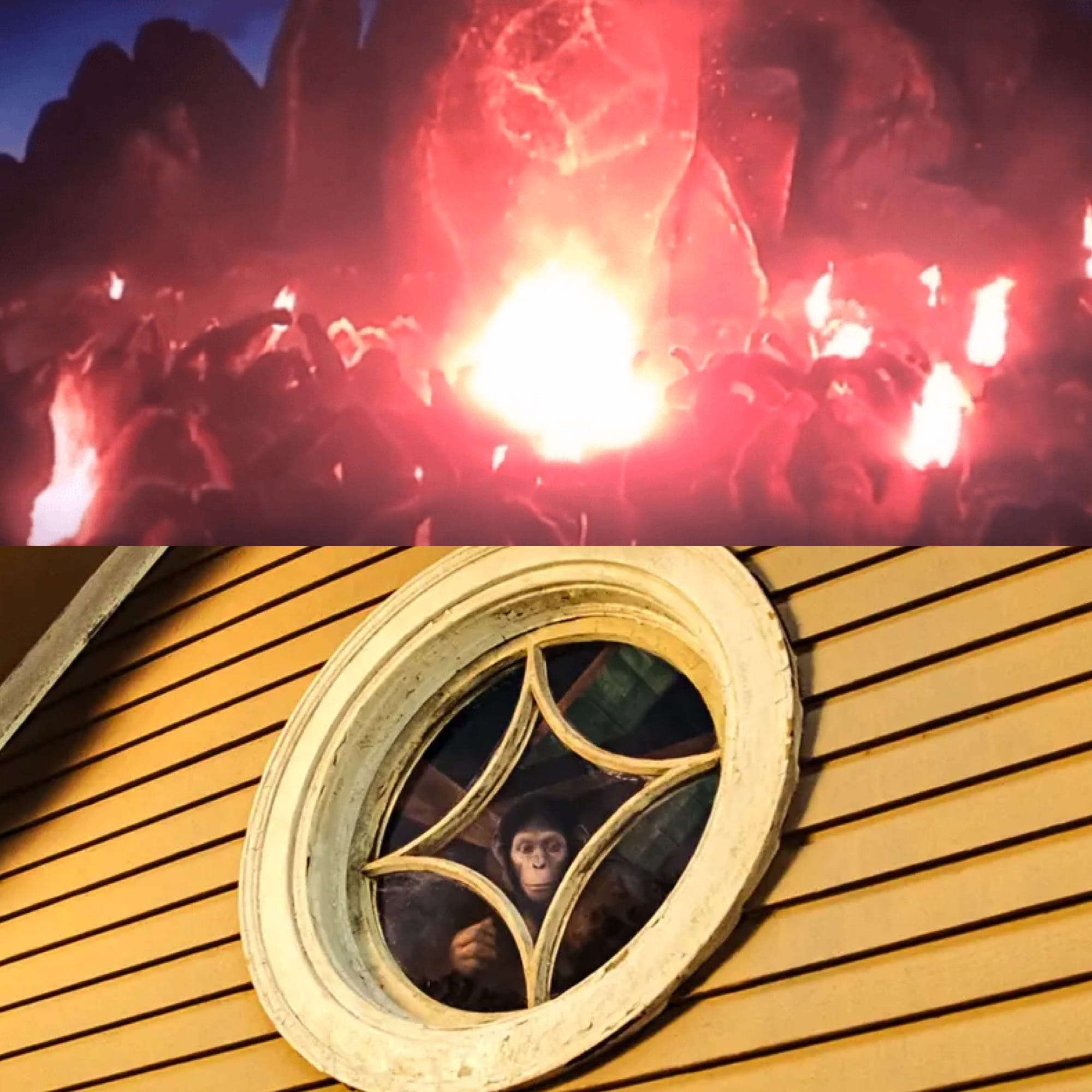
And thus, the Time of the Ape begins.
The years pass, and Caesar begins to fade from living memory, first becoming a historical figure, before stepping from history and into myth, becoming a name that while foundational to ape society, is venerated by some, and all but forgotten by others.
Fade to black…
Cut to a title that says “Many Generations Later,” which seems to be a couple hundred-ish years or so into the future, at least judging by the way the skeletal structures of the skyscrapers are still standing, but are completely overgrown and nearly consumed by vegetation. Much like the way the ruins of Roman Occupation in the British Isles became known as the home of long dead gods within only a few generations, we realize that the world of man has faded from ape memory, their mysteries colored over with new myths, as we meet three young chimps climbing the creaking heights of the towers. They are climbing to reach the eagle nests that have been built high up in the upper levels, and the eggs that are nestled there.
Speaking in a mix of broken English and Sign Language, the three chimps—Noa, son of the Keeper of the Birds, his girlfriend Soona, and his best friend, Anaya—are all part of the Eagle Clan, a community of apes who live in tranquility in the nearby valley. The trio have been friends since childhood, and they are now on the verge of the Clan’s rite of adulthood. As part of that ritual, they must procure an eagle’s egg from the high nests, and return it safely to the village, so that they can raise the hatchling as their bonded friend and companion.
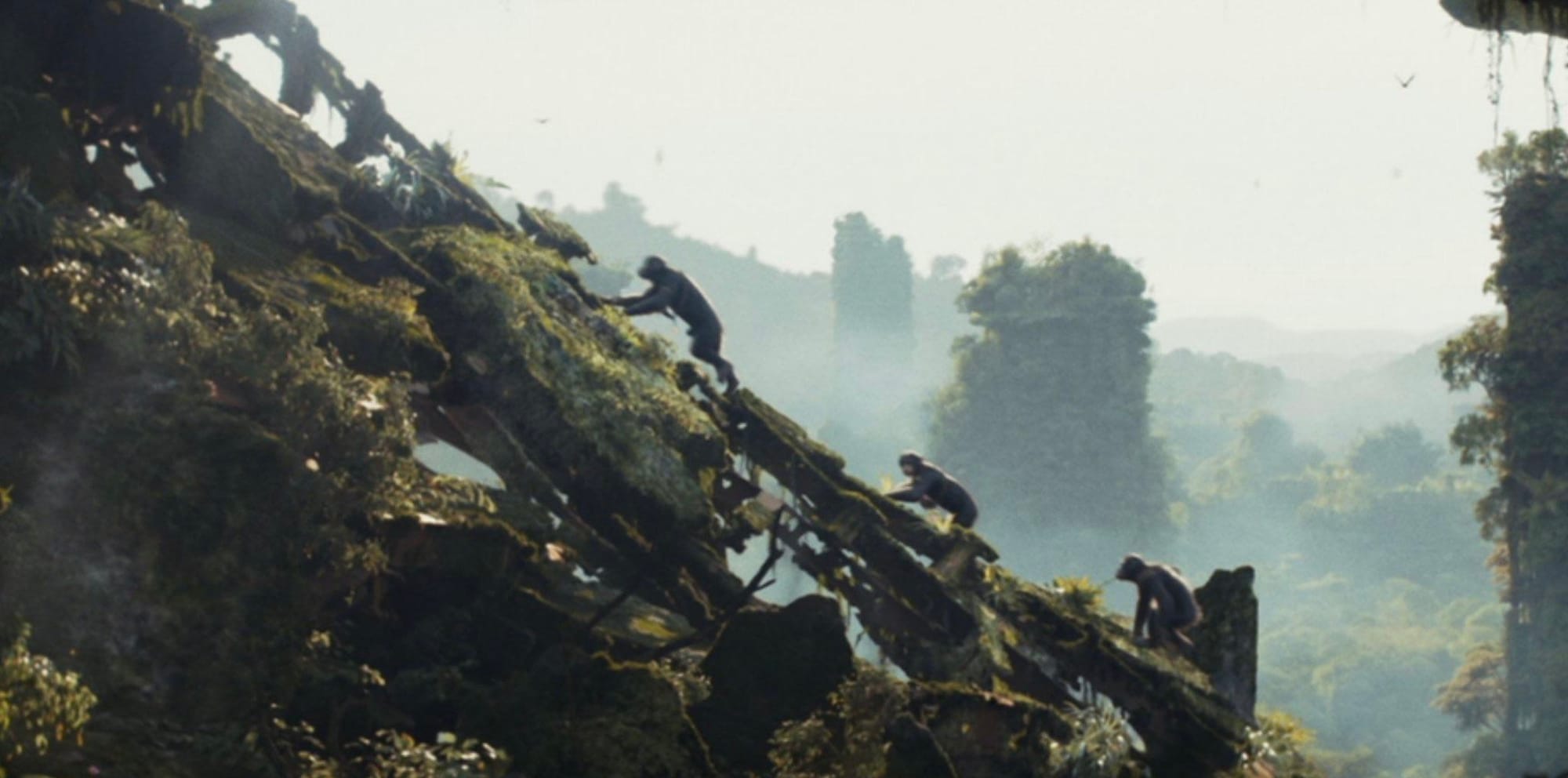
But when a lone human sneaks into their camp later that night, and during a confrontation with her, Noa’s egg is broken, he must return to the ruins alone, and at night, in order to get another, or he will miss the ritual. There, he crosses paths with an unknown clan of apes in iron masks and armed with cattle prods, who ride under the banner of a vicious king. These strange apes seem to be hunting the lone human that Noa encountered. Noa barely escapes them, but by the time he is able to get back to his valley home, he finds his village on fire, his people enslaved, his father murdered, and the strange invading apes in the iron masks who did all of this... they did it in the name of Caesar.
Noa is left for dead.
The next day, Noa awakens in the ruins of his village. All that’s left is him, his horse, and Eagle sun, his father’s eagle, who hates him. Vowing to free his people, he sets off, tracking the ape invaders and their prisoners. In the ruins of an airport, he meets Raka, an orangutan, whose partner was just killed by the invading apes. Raka wears the Eye of Caesar, a pendant in the shape of Caesar's window, because he is a Priest of Caesar the Lawgiver, as well as a historian of the time of Man, and while he might not be fully accurate in some of his historical facts, he comes close, telling Noa how the real Caesar was a strong and compassionate leader. Raka joins Caesar on his quest. Soon enough, a third approaches the shelter of their camp one night, shivering and cold from the heavy rains outside.
It’s same lone human who broke Noa’s egg…
In this world, humans are known as “echoes” for reasons that I either missed, or was never explained, but whatever the reason, I doubt it makes any sense, and is probably yet another time where a creator overthinks a future world reference, and ends up with something that feels forced, and not at all like language that evolved organically (see The 100 on the CW). Why would the apes not simply call them humans? Or even just beasts? It makes no sense that I can puzzle out.
But like I said, maybe they explained the reason why in the movie, and I just missed it, but I can't even No-Prize up a reason for why they call humans "echoes" and it's probably my one big Nerd complaint about this film. Although, you should keep in mind, "Nerd Complaints" are by definition nothing but a bunch of nitpicky nonsense, so you can pay it no mind, because otherwise I really enjoyed this film.
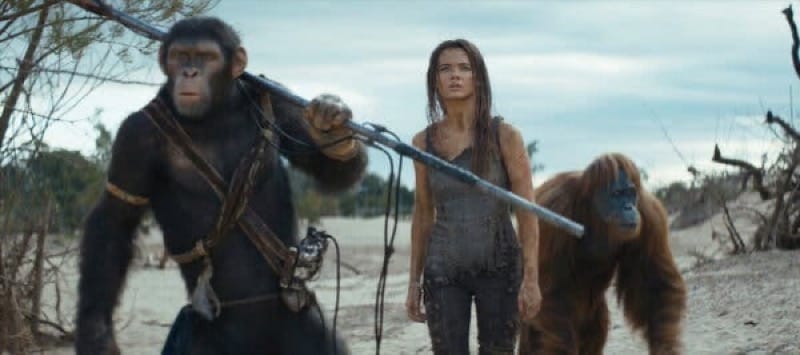
Anyway... at this point, most humans are basically dumb animals, always making the kind of face you'd expect to see on like... a mildly confused cow or something, and otherwise behave like a pack of wild dogs, running around the woods, sniffing each other's butts, and peeing on things, so the fact that this particular human isn't like that is the first hint we get that she is somehow special. She’s definitely dirty, yes, and she apparently stinks really badly too, but she’s also wearing skinny jeans and a tank top, and she has really nice eyebrows.
Right away, Noa wants to run her off, because humans suck in general. Plus, she did break his egg. But Raka stops him, telling him that Caesar showed mercy to the humans. Noa relents, and shares some food and his blanket. Since humans are all dumb animals, Raka announces that they will name her Nova, explaining to Noa that Caesar decreed long ago that all humans are called Nova, but the reason why is now lost to time. This name doesn’t last long though, as it turns out that Nova can speak, and her real name is Mae. Immune to the effects of the simian flu, Mae is from a now-destroyed community of other immune and still intelligent humans, all of whom were murdered by the bad apes, who were too eager in their desire to kill humans to understand that this particular group of humans remember the old ways of the World of Man. The bad apes have since realized this, which is why they are hunting her now.
But unbeknownst to all the apes, good and bad, Mae is also part of a network of humans who are still fighting to take the planet back from the apes.
One classic apes-hunting-humans-with-nets scene later, and our little group of heroes find themselves, along with the other members of the Eagle Clan, enslaved by an ape dictator known as Proximus Caesar. This community of apes lives on a beach outside the ruins of San Francisco (I think), in a rusted-out old hulk of a beached tanker ship, because I guess tetanus isn’t a worry.
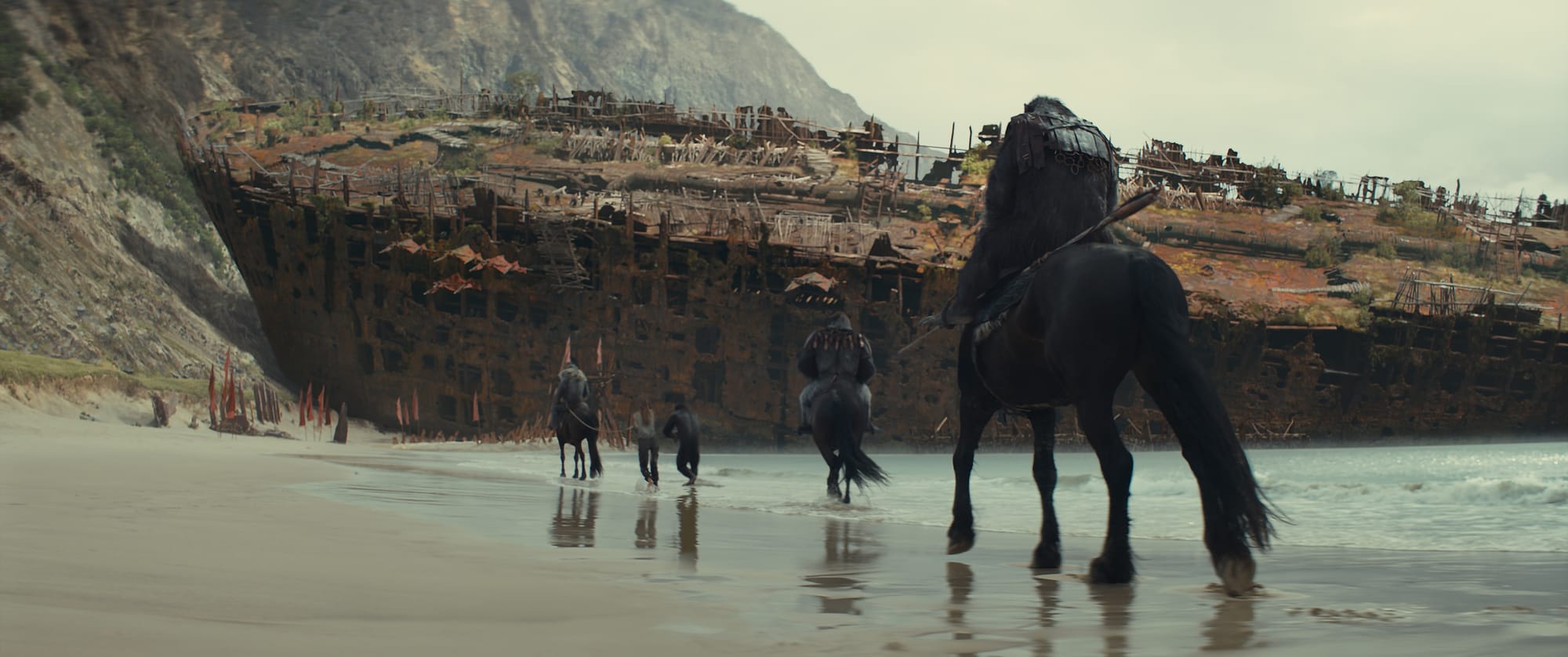
In this community, Proximus Caesar uses the legacy of Caesar much like American Christians use the Bible, as both a blunt weapon and as a tool for control. A fascist who perverts Caesar’s words for his own use, every morning, he greets his subjects by proclaiming that it is a “wonderful day,” reminding them that he is the rightful heir of Caesar, and that they must all work together because as Caesar decreed all those long years ago... apes are strong together. He does this because his coastline camp lays at the foot of sea-side cliff with the massive metal door of an old human bunker set in it, and Proximus wants the ancient technology within.
Mae not only can’t let Proximus have whatever it is that lies within that bunker, she also needs to get inside herself, for reasons she keeps hidden. Noa, meanwhile, wants to free his people, who Proximus has enslaved. Together, they hatch a plan, and after a bunch of general monkeying around, the film pretty much ends a little bit like The Lord of the Rings.
But as this is a Planet of the Apes movie, and most likely the start of a new trilogy, it soon becomes clear that while Proximus was a bad guy, he wasn't entirely wrong either, at least when it comes to how humans can't be trusted, because the real bad guy all along… is Man.
At the end of the film, we see Mae return to a human settlement hidden deep underground, beneath a line of old SETI dishes. It is a sterile community, sealed off from the world, and filled with humans who may not be immune to simian flu, but who are all still working on taking back the planet they consider to be theirs by right. Mae, one of the few immune humans, brings them a hard drive she grabbed from the beach bunker, which they use to align a dish and begin to contact other humans settlements. Despite reports otherwise, the death of mankind was greatly exaggerated, and they are not quite ready to cede control of the planet to the apes yet. And so, the battle for the planet of the apes continues, and all while bad signs and ill omens of what may lie ahead abounds...
For let us not forget the words of the Lawgiver… “Beware the beast Man, for he is the Devil's pawn. Alone among God's primates, he kills for sport or lust or greed. Yea, he will murder his brother to possess his brother's land. Let him not breed in great numbers, for he will make a desert of his home and yours."
Hallelujah! Praise be! Amen to the Lawgiver! Tell the truth in Caesar's name!
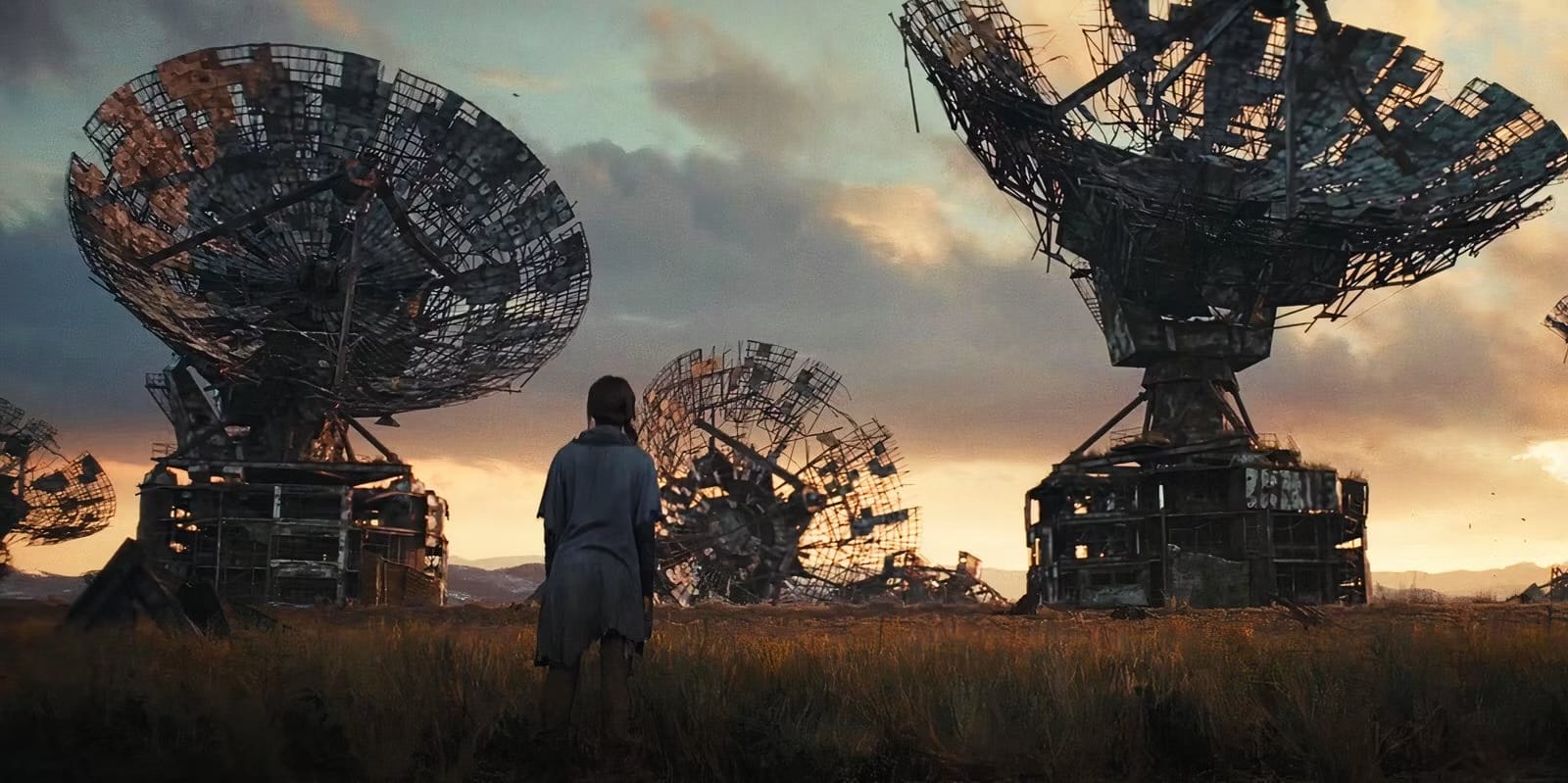
Smart, imaginative, fun, exciting, telling the story of a young prince who is forced by sudden circumstance to become a king, The Kingdom of the Planet of the Apes is basically a classic fantasy adventure story, and I loved that.
I also really liked they way the echoes of Caesar’s story were used, as this film probes how the better intentions of a person's ideals can be forgotten in time, and how their legacies can be twisted into something else, leading to the kind of toxic religious dogmas that are used by opportunistic leaders to romanticize the past, and push a bloody-minded agenda of reclaiming “the good old days” and all for the purpose of dominating the future.
A very topical subject to examine...
So, where do we go from here?
I suppose the next movie, if there is one, will probably feature the last gasp of the human race. Maybe it will be a thousand years in the future, and the underground humans will all mutate into a tribe of pale and bald telepathic freaks who worship the last Atom Bomb, like in Beneath the Planet of the Apes (1970). We shall see. However the next one goes, since the first film of the new trilogy back in 2011 had a very blink-and-you'll-miss-it brief mention that NASA has lost contact with the recent launch of the Icarus spaceship, I think it's a good bet that this new trilogy can only really end one way…
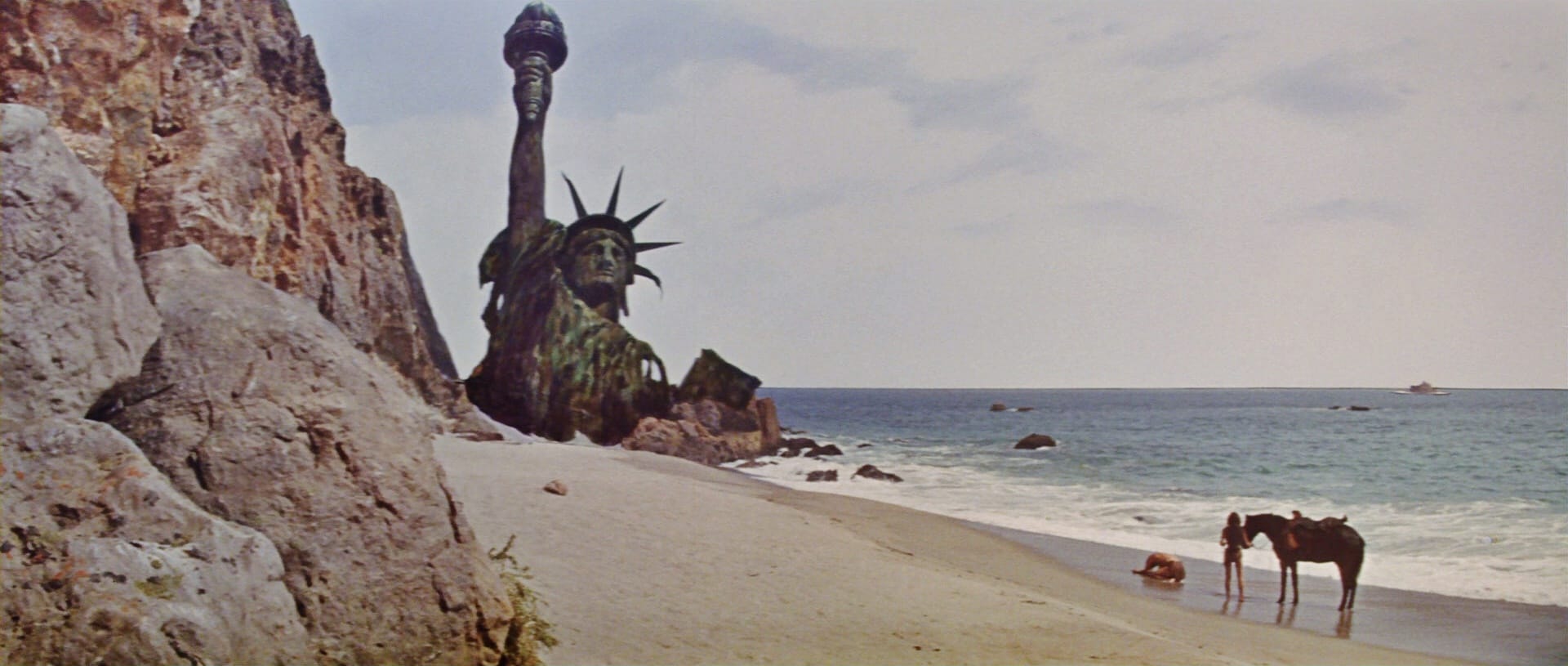
After all, Icarus was the nickname of the Liberty 1 spacecraft, commanded by Charlton Heston's George Taylor, in the Planet of the Apes (1968). Even more interesting? When the humans at the end of this film reach out with their massive satellite dishs, the first voice they hear identifies themselves as Fort Wayne. You naturally assume this means Fort Wayne, Indiana, which makes sense, as I think they might even say “Indiana” too, but I can’t recall, but I also think it's a fair guess to suspect that maybe they weren't talking to any Fort Wayne on Earth at all?
I say this for two reasons…
- Fort Wayne is obviously a reference to the 1968 film too, as George Taylor was originally from Fort Wayne.
- There’s a couple of different moments in this film where both human and ape look into this old telescope in the ruins of an observatory, and they are all very shocked by whatever it is that they see, and all while the camera cuts back to a mural of astronauts too. We don’t ever see what it was that the characters saw in that telescope, so who knows what it was. but… maybe it’s a space station? A space station with the callsign designation of Fort Wayne?
Who knows? This could definitely be nothing more than wild and unfounded speculation on my part, it's certainly happened before, but as far as I’m concerned, all signs point to yes. At the very least, I believe the door was potentially left open to the opportunity, so I guess we’ll see…
Maybe.
Small Tangent: Dichen Lachman briefly appears in this film. She used to be the bane of sci-fi projects, even more than Summer Glau, where, if she was in the cast, it meant that whatever you were about to watch was either terrible, or that it would soon be cancelled, or both, but then, she was also in the first season of Severance, and that has finally started to show signs of a season two, so maybe her bad luck streak has been broken. I don't know. Fingers crossed. But either way, it was a shock to see her. Hopefully the curse isn't still lingering.
Anyway, big thumbs up. This was a lot of fun.
